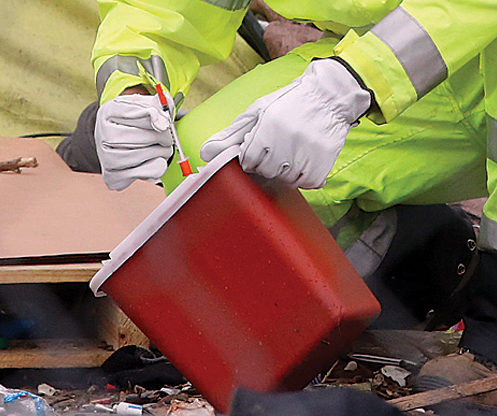A Sacramento Superior Court Judge has dismissed a lawsuit against the Harm Reduction Coalition of Santa Cruz County (HRC), a group that provides services for people that use drugs, many of whom are homeless.
The lawsuit was filed nearly one year ago in Sacramento Superior Court. In it, plaintiff Grant Park Neighborhood Association was trying to stop the organization’s syringe exchange program, saying that it poses a public health threat and constitutes a public nuisance.
The lawsuit alleged that HRC’s program violates the California Environmental Quality Act (CEQA) because they did not perform the environmental review needed for the distribution, collection and disposal of used needles.
The lawsuit also stated that HRC’s program operates “in direct conflict” with the county’s Syringe Services Program because it allows untrained volunteers to perform its services.
In a 30-page ruling, Sacramento Superior Court Judge Laurie Earl pointed out that Assembly Bill 1344—signed by Gov. Gavin Newsom in October—exempts syringe exchange programs from environmental review and therefore rendered the CEQA part of the lawsuit moot.
“This is a massive victory for us,” HRC Fiscal Director Kate Garrett stated in a press release. “We have wasted so much time having our resources drained by this lawsuit and being forced to turn our attention away from the fight against HIV, Covid-19, hepatitis, overdoses, and all of the other harms our participants experience.
The lawsuit was filed at the height of the Covid-19 pandemic against two organizations already working around the clock fighting its spread, Garrett added.
“I could not be more relieved to see the core causes of action be rejected completely as we have actual work to do for our community,” she continued.
David Terrazas, who was among numerous plaintiffs, says that the decision is “bad for the people of Santa Cruz County.”
He pointed out that the judge in a preliminary decision ruled in favor of the plaintiffs, a decision that changed after Assembly Bill 1344 was passed.
Terrazas says that HRC last year distributed more than 796,000 syringes in Santa Cruz County, and only collected back about 432,000.
“The state’s actions have effectively immunized their program from any local accountability for their bio-waste in the environment and destroyed the County Health and Human Services distribution program that also focused their efforts on providing professional health care and addiction recovery support services in connection with needle distribution,” Terrazas says.
He adds that “all available options are currently under consideration” when considering future legal action.
HRC organizers say that the public nuisance piece could still move forward, but that those claims will be difficult to prove.
Denise Elerick, who started the program in 2018, says the dismissal signals a broader shift in the negative public perception of syringe exchange programs.
“This was far larger than Santa Cruz County,” she says. “This has statewide ramifications. Other programs have been shut down, and this will put an end to that. They won’t stop, but we won’t either.”
The lawsuit also alleged that California Department of Public Health only allowed a 45-day public comment period, rather than a 90-days, but Judge Earl ultimately said that this was not a factor in the lawsuit. She also rejected plaintiff’s claims that state officials only consulted with Santa Cruz County Sheriff Jim Hart and then Santa Cruz Police Chief Andy Mills, pointing out that the other law enforcement officials were allowed to write in with their comments.
HRC has long been criticized by residents who claim that they frequently find syringe litter scattered throughout the county.
But Elerick has long rejected assertions that supplemental syringe services programs result in increased litter.
“Syringe litter is simply a symptom of the public health crisis, and we have not talked about overdoses and saving lives,” she says.
Elerick says the program was never intended to replace the county’s programs, but to supplement them. She says that HRC helps numerous drug users and has removed tens of thousands of needles from public spaces. The group also refers drug users to county programs.
In addition, the organization claims to have helped during the Covid-19 pandemic by distributing more than 65,000 masks, 2,780 bottles of hand sanitizer and more than 45,000 disposable gloves, all for free through their syringe services program.
“An environmental lawsuit without merit, without any facts, without any science behind it isn’t anything more than a personal attack, and an attempt to bully and shut us down,” she says.
HRC Program Coordinator Dani Drysdale says that the lawsuit impacted the organization’s operations, as organizers missed essential training to battle it.
“It’s hard to calculate exactly how much damage this did, but despite all of the time and money we have been forced to waste on this lawsuit, the fact is that we are coming into the new year with more people, more funding, more services, and a huge weight off of our shoulders,” Drysdale says.













